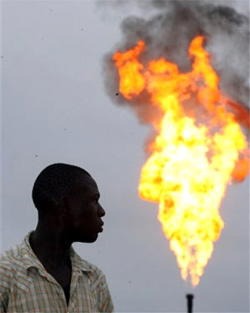Power Failures: Nigeria losses 20,100GWh to gas flaring in 9 months
 Gas flaring incidents have THERE are indications that Nigeria lost about 20,100 Gigawatts per hour of power generation potentials to the persistent gas flaring by oil companies operating in the country in the first nine months of this year, 9M’24
Gas flaring incidents have THERE are indications that Nigeria lost about 20,100 Gigawatts per hour of power generation potentials to the persistent gas flaring by oil companies operating in the country in the first nine months of this year, 9M’24
This represents 5.5 per cent increase when compared to the 19,000 Gigawatts per hour generation potential lost in the corresponding period of 2023.
Checks by Vanguard indicated that the country’s struggle to generate above 4,000 megawatts, MW of electricity to serve households and businesses, is due partly to limited gas supply to the Electricity Generation Companies, GENCOs.
Nigeria’s gas flaring has risen by 8 per cent in nine months, to 200.5 million standard cubic feet, MSCF, from 190.2 million Mscf recorded in the corresponding period of 2023.
However, data obtained from the latest report of the National Oil Spill Detection and Response Agency, NOSDRA, put the monetary value of the 200.5 MSCF flared gas during the period at $701.8 million.
According to NOSDRA, the defaulting companies, including the International Oil Companies, IoCs, were liable to fines amounting to $401 million.
Providing a further breakdown of the volume of gas flared across oilfields, NOSDRA disclosed that flaring by companies operating onshore rose by 10 percent to 105.5 mscf, against 95 mscf flared by companies operating offshore.
According to NOSDRA, the volume of gas flared during the period under review was equivalent to a carbon dioxide emission of 10.7 million tonnes.
NOSDRA lamented that despite efforts to reduce gas flaring, it has continued in Nigeria since the 1950s, releasing carbon dioxide and other gaseous substances into the atmosphere.
Checks by Vanguard indicated that is Nigeria likely to continue to record grid collapse, due to some problems, including inadequate gas supply to power plants.
The Executive Director, of PowerUp Nigeria, a power sector policy advocacy group, Adetayo Adegbemle, said: “Many factors culminate in system collapse but these are very negatively impacting. It should be noted that system collapse occurs as a result of frequency variation when the pull from consumer ends is sharply different from what generation can supply.
”A system collapse is like what happens when you put on your generator in the house, but the load in the house surpasses the capacity that your generator can supply. The system collapse affects the Electricity Generation Companies, GENCOs, as it causes damage to the generating plants.
“It also affects the economy because all economic activities that depend on electricity are shut down or disrupted until the grid is restored, thereby causing losses, both financially and damages to electrical systems. Some manufacturing equipment will not function until there is frequency balance on the grid.”
He added: “There are systems that are supposed to be installed to maintain the grid, and used for grid system planning. The SCADA system is meant to help balance the grid and plan for such occurrences, but unfortunately, we have spent so much funds and time getting this system installed, that we are still not sure when this will be completed by the Transmission Company of Nigeria.”













